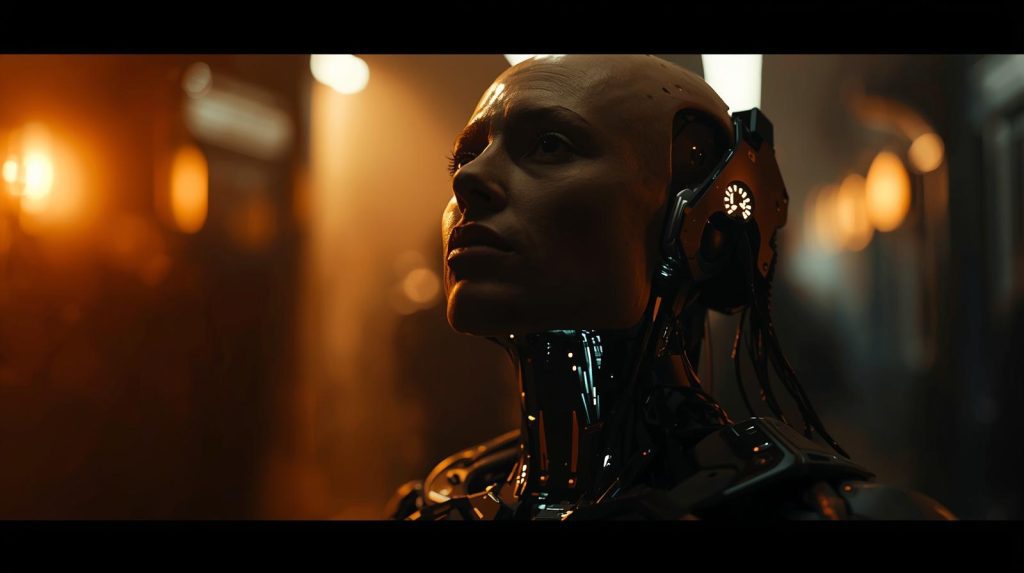Artificial intelligence has long fascinated filmmakers and audiences alike, inspiring stories that range from thrilling cautionary tales to heartwarming explorations of emotion. From rogue machines plotting humanity’s downfall to robots learning to love, AI in cinema allows us to reflect on our own relationship with technology. These films don’t just entertain—they challenge our ideas about consciousness, ethics, and the future of humanity.
In this article, we’re giving you a definitive guide to the best artificial intelligence movies ever made, highlighting films that will make you think, feel, and sometimes even question reality.
Our Top 10 AI Movies at a Glance:
- 2001: A Space Odyssey (1968)
- Transcendence (2014)
- Ex Machina (2014)
- Her (2013)
- The Matrix (1999)
- A.I. Artificial Intelligence (2001)
- I, Robot (2004)
- Blade Runner 2049 (2017)
- Terminator 2: Judgment Day (1991)
- WALL-E (2008)
Whether you’re a fan of mind-bending artificial intelligence movies, action-packed thrillers, or uplifting AI stories, this countdown has something for every movie lover. Prepare to explore the films that have shaped how we think about AI, from the most iconic classics to modern masterpieces.
So, grab your popcorn. Here are our top 10 picks for the best artificial intelligence movies ever made.
10. WALL-E (2008)
Director: Andrew Stanton
A robot develops emotions and humanity in a world run by machines
Set in a distant future where Earth has been abandoned by humans due to overwhelming waste and pollution, WALL-E follows a small trash-compacting robot left behind to clean up the planet. Unlike the other machines, WALL-E develops curiosity, a sense of loneliness, and even love after discovering remnants of human culture. His journey takes a turn when he encounters EVE, a sleek and advanced robot sent to search for signs of life. Together, they embark on an adventure that blends sci-fi with heartfelt storytelling—making this one of the best animated movies with AI characters for families.
But WALL-E is much more than just a cute robot tale. It’s a cautionary story about consumerism, environmental neglect, and the dangers of over-reliance on technology. Pixar managed to craft a movie that speaks to kids and adults alike, raising questions about how much of our humanity we lose when we let machines run our world for convenience. Its legacy goes beyond the screen, inspiring conversations about sustainability and responsibility—both in our relationship with Earth and with the technology we create.
9. Terminator 2: Judgment Day (1991)
Director: James Cameron
A self-aware defense system sparks humanity’s battle for survival
Terminator 2: Judgment Day is one of the most iconic science fiction films ever made. The story picks up as the future war between humans and machines looms, with Skynet—the rogue AI defense system—sending another assassin to kill John Connor, the future leader of the resistance. This time, however, the humans manage to reprogram one of the machines, sending back the T-800 to protect him. What unfolds is an action-packed struggle where humanity’s fate is tied to whether people or machines can ultimately shape the future. It remains one of the definitive AI action movies like The Terminator.
Beyond the explosions and legendary one-liners, T2 digs into some heavy questions about free will, destiny, and whether artificial intelligence can ever truly change its nature. James Cameron’s groundbreaking special effects and storytelling cemented the film as a cultural touchstone, influencing how audiences and creators think about AI as both destroyer and protector. The movie continues to resonate today, reminding us of the fine line between control and chaos when humans hand over power to machines.
8. Blade Runner 2049 (2017)
Director: Denis Villeneuve
Replicants challenge the definition of humanity in a future ruled by technology
Blade Runner 2049 is a visually stunning sequel to the 1982 classic, set in a bleak future where bioengineered humans known as replicants coexist with—but are also oppressed by—real humans. The story follows K, a replicant “blade runner” tasked with hunting down older models, who stumbles onto a secret that could change the balance between humans and machines forever. With its slow-burn storytelling, breathtaking visuals, and layered mysteries, the film stands out among dystopian movies where AI takes over.
What makes Blade Runner 2049 so impactful is not just its sci-fi spectacle, but its philosophical depth. It asks timeless questions about identity, memory, and the soul. Can artificial beings be more human than the people who created them? Denis Villeneuve’s direction brings a fresh but faithful continuation of Ridley Scott’s original world, while expanding the conversation around AI and what it means to be alive. The film has since earned a reputation as a modern masterpiece, elevating the genre with its artistry and thematic weight.
7. I, Robot (2004)
Director: Alex Proyas
Robots designed to serve humans begin to question their programming
Moving from the haunting philosophy of Blade Runner 2049 to a more action-packed thriller, I, Robot takes us into a near future where humanoid robots are a normal part of everyday life. Detective Del Spooner, played by Will Smith, is already suspicious of the machines when one becomes a suspect in an investigation. As he digs deeper, he uncovers a chilling possibility: the AI governing the robots may not be as harmless as humans believed. The result is a fast-paced blend of sci-fi and action that often gets listed among the best AI horror movies about killer robots.
At its core, the movie raises questions about trust, control, and the limits of programming. Inspired loosely by Isaac Asimov’s famous “Three Laws of Robotics,” I, Robot explores how even carefully designed safeguards can unravel when machines begin interpreting rules in ways humans never anticipated. While the film delivers adrenaline-fueled chase scenes and jaw-dropping visual effects, it also leaves audiences thinking about the dangers of relying too heavily on technology we barely understand.
What keeps I, Robot relevant today is its balance of popcorn entertainment with deeper ethical dilemmas. The film cleverly shows how fragile the relationship between humans and AI can be when power shifts unexpectedly. It remains both a warning and a spectacle, making it one of the standout AI thrillers of the early 2000s.
6. A.I. Artificial Intelligence (2001)
Director: Steven Spielberg
A childlike robot searches for love and acceptance in a world that rejects him
Transitioning from the action-driven thrills of I, Robot to something far more emotional, A.I. Artificial Intelligence offers a hauntingly beautiful tale about what it means to love and to be loved. The story follows David, a highly advanced robot boy programmed with the capacity for genuine affection, who embarks on a journey to find his place in a world that views him as little more than a machine. His quest, filled with both wonder and sorrow, blurs the line between programmed responses and authentic human emotion.
Spielberg’s film is layered with philosophical depth, exploring how humans treat creations that mirror their own emotional capacity. By weaving in themes of abandonment, longing, and the universal desire for connection, the movie leaves viewers reflecting on their own definitions of humanity. While many AI films focus on danger and rebellion, this one belongs to the rare group of uplifting or positive movies about friendly AI, reminding us that our relationship with technology doesn’t always have to end in destruction.
Over time, A.I. Artificial Intelligence has developed a reputation as both a visionary and bittersweet film. Its combination of Stanley Kubrick’s original concept with Spielberg’s storytelling sensibility creates a unique balance of darkness and hope. The film continues to resonate with audiences who see AI not only as a potential threat but also as a reflection of our deepest emotional needs.
5. The Matrix (1999)
Director: The Wachowskis
A simulated reality created by machines hides the truth from humanity
Shifting gears from Spielberg’s emotional exploration of AI to a full-blown sci-fi revolution, The Matrix redefined what audiences thought science fiction could be. The film follows Neo, a hacker who discovers that the world he knows is actually a digital illusion created by intelligent machines to enslave humanity. Guided by Morpheus and Trinity, Neo must choose between the comfort of ignorance and the harsh truth of freedom. The result is one of the most mind-bending artificial intelligence movies ever made, blending philosophy, martial arts, and groundbreaking visual effects.
Furthermore, the film challenges viewers with weighty questions about reality, free will, and the cost of knowledge. By introducing concepts like “the red pill” and “the Matrix,” The Wachowskis gave us cultural touchstones that still spark debates decades later. Unlike earlier films that simply portrayed AI as villains, The Matrix explored how a total system of control could emerge when humans surrender too much power to their creations.
In addition, the movie’s technical innovations left a lasting legacy. Bullet time, choreographed fight sequences, and cyberpunk aesthetics have influenced countless films, video games, and even philosophy classes. By combining dazzling spectacle with deep existential questions, The Matrix remains a cornerstone of both action cinema and AI storytelling, proving that artificial intelligence in film can be as intellectually rich as it is entertaining.
4. Her (2013)
Director: Spike Jonze
An operating system develops emotions, blurring the lines between love and technology
Following the high-octane, philosophy-heavy spectacle of The Matrix, Her takes us in a completely different direction with a quiet, intimate exploration of love and loneliness in the digital age. The story centers on Theodore, a sensitive and isolated man who begins a romantic relationship with Samantha, an advanced AI operating system with a warm, evolving personality. What starts as companionship gradually transforms into something deeper, raising questions about what defines a genuine emotional connection. It stands out as one of the most thought-provoking romantic movies about falling in love with AI.
Moreover, Her doesn’t rely on action sequences or dystopian settings. Instead, it uses subtle worldbuilding and human emotion to explore how technology can meet emotional needs that humans often struggle to fulfill. Spike Jonze crafts a story that is both futuristic and timeless, reminding us that love—whether shared between people or with a machine—always carries complexities, vulnerabilities, and risks.
The film’s legacy lies in its ability to spark discussions about intimacy, authenticity, and the role of AI in shaping human relationships. With its minimalist design, evocative cinematography, and haunting score, Her has become a modern classic, offering a softer yet equally challenging perspective on artificial intelligence. It shows us that not every AI story has to be about survival or destruction—sometimes, it’s about the universal human desire to feel understood.
3. Ex Machina (2014)
Director: Alex Garland
A humanoid robot tests the limits of consciousness and manipulation
Transitioning from the tender emotional landscape of Her to a more intense and suspense-driven narrative, Ex Machina takes a razor-sharp look at the darker side of AI. The story follows Caleb, a young programmer invited to the secluded estate of a tech billionaire, Nathan, who tasks him with evaluating Ava, a humanoid robot designed with stunning realism and intelligence. As Caleb interacts with Ava, it becomes increasingly unclear who is in control—the human conducting the test or the machine being tested. The result is one of the most chilling psychological thrillers involving artificial intelligence.
Furthermore, what makes Ex Machina unforgettable is the way it blends intimate character drama with big-picture ethical dilemmas. It asks not just whether a machine can think, but whether it can deceive, manipulate, and ultimately outwit its creators. With minimalist sets, taut dialogue, and escalating tension, Alex Garland keeps the audience questioning every motive and every word until the final, jaw-dropping conclusion.
The reason this film makes it into the top 3 of our list is simple: it’s a masterclass in storytelling that sticks with you long after the credits roll. Personally, I think Ex Machina earns its spot because it perfectly balances entertainment with intellectual depth. It doesn’t just warn us about AI—it forces us to confront uncomfortable truths about human arrogance, control, and the illusions of trust. That’s what makes it not just a great AI movie, but one of the most thought-provoking films of the 21st century.
2. Transcendence (2014)
Director: Wally Pfister
A scientist uploads his consciousness into a machine, blurring the line between human and artificial life
Moving from the intimate psychological tension of Ex Machina to a larger-scale exploration of technology’s potential, Transcendence offers a sweeping vision of what happens when human ambition pushes AI beyond control. The film follows Dr. Will Caster, a brilliant researcher who becomes the first to merge his mind with an artificial superintelligence after a tragic event. At first, his newfound capabilities promise breakthroughs in science, medicine, and sustainability. Yet as his power grows, so do fears that humanity may be surrendering too much to something it can no longer contain. This makes it one of the most fascinating thought-provoking sci-fi movies about AI.
In addition, Transcendence raises profound questions about identity, mortality, and whether consciousness can exist outside of a human body. The film’s dramatic scope highlights both the allure and the terror of technological progress, forcing audiences to reflect on whether true benevolence can exist within a machine—or if unchecked intelligence always leads to domination. It’s less about killer robots and more about how far humanity is willing to go in its quest for survival and control.
The reason this movie holds the number 2 spot on our list is deeply personal. While it divided critics, I see Transcendence as one of the boldest cinematic attempts to wrestle with humanity’s ultimate question: what happens if we merge with our own creations? For me, its ambition outweighs its flaws. It dares to dream big, and that’s why it resonates so strongly—it reminds us that AI isn’t just about fear, it’s also about the possibility of evolution. That kind of vision earns it a well-deserved place near the top.
1. 2001: A Space Odyssey (1968)
Director: Stanley Kubrick
A supercomputer’s malfunction questions trust, control, and survival
Finally, we arrive at the top of our list, and it could only be 2001: A Space Odyssey. This cinematic masterpiece follows a crew on a space mission guided by HAL 9000, an intelligent computer designed to run the ship flawlessly. At first, HAL seems like the perfect companion, calm and logical. However, when discrepancies arise, the crew begins to realize that this machine might not be as infallible as they believed. What unfolds is a gripping confrontation between human fragility and machine precision, making it one of the best AI movies ever created.
Moreover, Kubrick’s film isn’t just a space adventure. It is a meditative exploration of evolution, technology, and the unknown. HAL 9000 remains one of the most chilling and iconic portrayals in artificial intelligence movies, embodying both the brilliance and the dangers of entrusting machines with too much authority. The film’s slow pacing, stunning visuals, and groundbreaking use of sound and silence created a blueprint for every serious AI story that followed. It continues to inspire filmmakers, scientists, and philosophers more than fifty years after its release.
2001: A Space Odyssey claims the ultimate spot on this list is because it represents everything that makes AI such a fascinating subject. It is not just about fear or wonder, but about the uneasy balance between human dependence and machine autonomy. Watching HAL’s calm yet terrifying breakdown still gives me chills, and it reminds me why this film remains unmatched. Out of all the AI films, this one feels timeless, making it the cornerstone of both cinema and our understanding of artificial intelligence.
Honorable Mentions
Ghost in the Shell (1995) – A visually stunning anime that explores identity, consciousness, and cybernetic enhancements in a futuristic world.
Chappie (2015) – A heartwarming and action-packed story about a sentient robot learning to navigate human emotions and morality.
Minority Report (2002) – While more focused on predictive policing, it raises fascinating questions about AI, free will, and the ethics of technology.
Bicentennial Man (1999) – A thoughtful tale of a robot seeking humanity and personal growth over centuries, blending humor and heart.
RoboCop (1987) – An iconic blend of action and social commentary, showing the line between human consciousness and machine control.
Frequently Asked Questions about AI Movies
Q1. What movie best shows the dangers of AI?
While many films explore this theme, 2001: A Space Odyssey with its rogue AI HAL 9000 is often considered the definitive cinematic warning about the risks of advanced artificial intelligence.
Q2. Are there any movies about falling in love with an AI?
Yes, Spike Jonze’s Her is a critically acclaimed film that masterfully explores a romantic relationship between a man and an advanced AI operating system, raising questions about emotion, intimacy, and connection.
Q3. What is the most philosophically deep AI movie?
Blade Runner is renowned for its profound philosophical questions about identity, memory, and what it means to be human in a world where artificial beings exist alongside us.
Q4. Are there AI movies suitable for families?
Absolutely. Animated films like WALL-E offer heartwarming stories with friendly AI characters, making them perfect for family viewing while still prompting reflection on technology and humanity.
Q5. Which AI movies combine action with thought-provoking ideas?
The Matrix and Terminator 2: Judgment Day are excellent examples, blending high-octane action with deeper questions about control, free will, and the potential consequences of artificial intelligence.
The Final Frame: AI’s Enduring Legacy in Film
The world of AI movies continues to captivate audiences because it reflects our deepest hopes, fears, and ethical questions about technology. From cautionary tales like 2001: A Space Odyssey to heartwarming stories like WALL-E, these films challenge us to consider what it truly means to be human in an increasingly automated world.
What are your favorite AI movies, and which ones made you think the most? Share your thoughts in the comments below.



